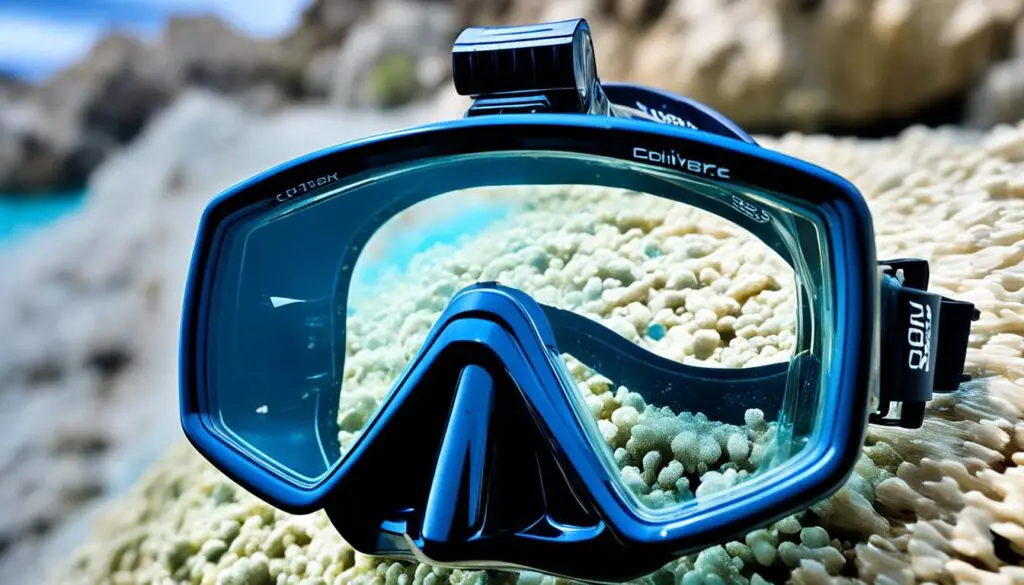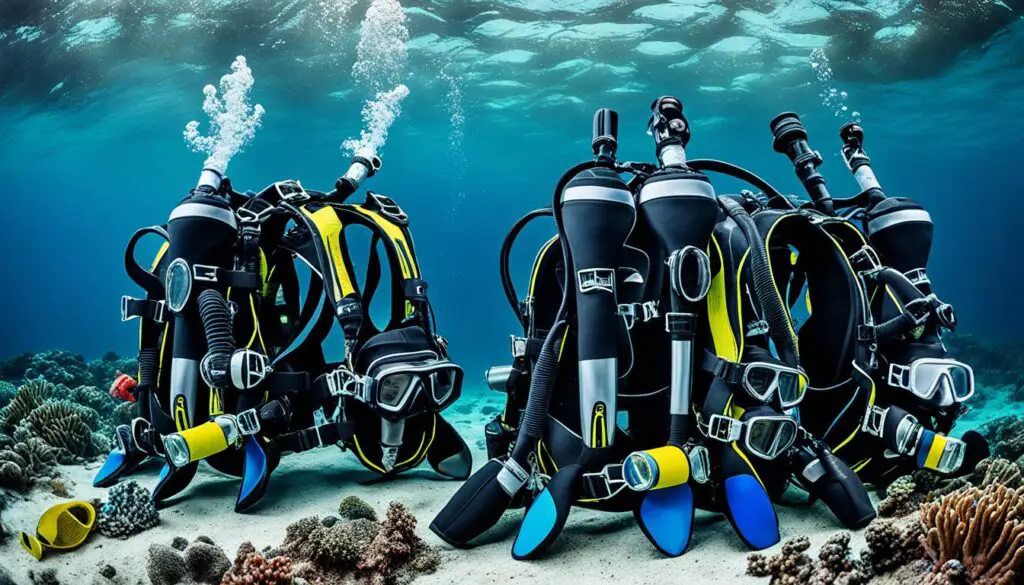Choosing the right scuba gear is essential for beginners to have a safe and enjoyable diving experience. In this beginner scuba gear guide, we will cover all the equipment you need for your first dive. We have gathered information from various sources to provide you with a comprehensive list of gear and tips to ensure a successful underwater adventure.
Key Takeaways:
- Scuba gear is crucial for beginners to have a successful first dive.
- The essential gear includes a dive mask, snorkel, fins, wetsuit, BCD, regulator, and dive computer.
- Choosing gear that fits well, is comfortable, and of good quality is important.
- Proper training, safety guidelines, and regular gear maintenance are vital for beginner scuba divers.
- Practicing necessary skills and diving with a buddy contribute to a safe and enjoyable diving experience.
Essential Scuba Gear for Beginners
When it comes to scuba diving, having the right gear is crucial, especially for beginners. The essential scuba gear for beginners includes a dive mask, snorkel, fins, wetsuit, BCD (buoyancy control device), regulator, and dive computer. Let’s take a closer look at each of these items and understand their importance in ensuring a safe and enjoyable underwater experience.
Dive Mask

A dive mask is an essential piece of equipment that allows you to see clearly underwater. It creates an air pocket around your eyes, enabling you to focus and enjoy the beautiful marine life without any distortion. A well-fitted mask with a silicone skirt ensures a watertight seal, preventing water from entering and providing a comfortable fit.
Snorkel
A snorkel is a tube-like device that allows you to breathe while floating face down at the surface. It eliminates the need to raise your head to inhale, providing a more relaxed and efficient breathing experience. A good snorkel should have a comfortable mouthpiece, a purge valve to clear water, and a snorkel keeper to secure it to your mask.
Fins
Fins provide propulsion and maneuverability in the water, allowing you to move more efficiently and effortlessly. They come in various styles, including open-heel and full-foot fins. Open-heel fins are worn with dive boots for added comfort and protection. Choosing the right size and type of fins is crucial for a comfortable fit and optimal performance.
Wetsuit
A wetsuit not only keeps you warm but also protects your skin from stings, scratches, and sunburn. It provides an insulating layer of neoprene that traps a thin layer of water next to your skin, which is warmed by your body heat, keeping you comfortable in colder water. A well-fitted wetsuit should be snug but not restrictive, allowing for easy movement and flexibility.
BCD (Buoyancy Control Device)
A BCD is a vital piece of equipment that helps you control your buoyancy underwater. It allows you to adjust your position and maintain neutral buoyancy, making it easier to explore and conserve energy. A BCD should have integrated weight pockets, easy-to-use inflation and deflation controls, and sufficient lift capacity to support your body and any additional gear.
Regulator
A regulator is responsible for delivering air from your scuba tank to your mouth. It consists of a first stage that reduces the tank pressure to an intermediate pressure, and a second stage that delivers the air on demand when you inhale. A good regulator should provide smooth and reliable airflow, be comfortable to breathe from, and have easy-to-access controls.
Dive Computer
A dive computer is like your underwater guide, monitoring important dive information such as depth, time, ascent rate, and decompression limits. It helps you plan and execute safe dives by providing real-time data and alerts. Some dive computers also offer additional features like Nitrox compatibility and dive log capabilities.
Investing in the right scuba gear will enhance your diving experience and ensure your safety underwater. It’s important to choose gear that fits well, is comfortable to use, and meets your specific diving needs. By having the essential scuba gear mentioned above, you’ll be equipped and ready to explore the mesmerizing underwater world with confidence and ease.
Choosing the Right Scuba Gear
When it comes to scuba diving, choosing the right gear is essential for a safe and enjoyable experience. There are several factors to consider when selecting scuba gear, including fit, comfort, quality, rentals, and budget.
Fit: Properly fitting gear is crucial for a secure and comfortable dive. Ill-fitting equipment can cause discomfort, leakage, or difficulty in maneuvering underwater. It’s important to try on different sizes and styles to find the gear that fits you best.
Comfort
Comfort: Comfort is key during a dive, as it allows you to focus on exploring the underwater world. Look for gear that is designed with features such as adjustable straps, ergonomic shapes, and soft or cushioned materials. Prioritize comfort to enhance your overall dive experience.
Quality
Quality: Investing in high-quality gear is crucial for safety and durability. Reliable scuba equipment will perform well underwater and withstand the rigors of regular use. Research reputable brands and read customer reviews to ensure you are choosing gear that meets industry standards.
Rentals and Budget
Rentals: For beginners, renting scuba gear can be a cost-effective option. Renting allows you to try out different equipment before making a bigger investment. It’s important to choose a reputable dive shop that regularly maintains and sanitizes their rental gear.
Budget: Setting a budget helps you narrow down your options and prioritize essential items. Determine how much you are willing to spend on scuba gear and focus on finding the best quality equipment within your budget. Remember, safety should always be a top priority, so allocate enough funds for reliable gear.
By considering factors such as fit, comfort, quality, rentals, and budget, you can make an informed decision when choosing scuba gear. Prioritize safety and comfort while selecting equipment that aligns with your diving goals and budget.

Tips for Beginner Scuba Divers
As a beginner scuba diver, there are several important tips to keep in mind to ensure a safe and enjoyable diving experience. Here are some key recommendations:
- Undergo Proper Training: Before venturing into the underwater world, it is crucial to complete a certified scuba diving training program. This training will equip you with the necessary skills and knowledge to handle various underwater situations and emergencies.
- Follow Safety Guidelines: Always prioritize safety during your dives. This includes adhering to the buddy system, maintaining proper buoyancy, and monitoring your depth and air supply. Familiarize yourself with the specific safety protocols of your diving location.
- Regular Gear Maintenance: To ensure optimal performance and safety, regularly inspect and maintain your scuba gear. This includes properly rinsing and drying your equipment after each dive, checking for any signs of wear or damage, and servicing your gear as recommended by the manufacturer.
- Practice Essential Skills: Building confidence underwater requires consistent practice of essential diving skills. Focus on mastering techniques such as mask clearing, buoyancy control, and proper breathing. Utilize controlled practice sessions in a pool or confined water before applying these skills in open water.
- Use Checklists: Creating and following checklists can help ensure that you complete all necessary steps before and during your dive. These checklists should include tasks such as equipment checks, pre-dive safety checks, and emergency procedures. Follow the checklist diligently to minimize the risk of forgetting vital actions.
- Dive with a Buddy: It is highly recommended to dive with a buddy whenever possible. Diving with a partner enhances safety by allowing for shared experiences, assistance in case of emergencies, and improved communication underwater. Maintain close proximity and regularly check on each other throughout the dive.
- Communicate Effectively: Clear and effective communication is essential underwater. Use specific underwater hand signals to relay messages to your diving buddy, such as indicating your air supply, signaling for assistance, or pointing out interesting marine life. Practice and familiarize yourself with these signals before your dive.
By following these tips, you can enhance your training, ensure safety, maintain your gear, practice essential skills, use checklists, and communicate effectively during your scuba diving adventures.
Conclusion
In conclusion, having the right scuba gear is crucial for beginners to have a successful first dive. The essential equipment, including a dive mask, snorkel, fins, wetsuit, BCD, regulator, and dive computer, ensures a safe and enjoyable underwater experience.
Choosing gear that fits well, is comfortable, and of good quality is of utmost importance. Ill-fitting gear can cause discomfort and hinder performance, while low-quality gear may compromise safety. It is recommended to invest in high-quality gear that meets safety standards and provides long-lasting durability.
Not only is the gear important, but beginners should also prioritize their safety by undergoing proper training. Scuba diving involves unique skills and techniques that need to be learned and practiced. By enrolling in a reputable scuba diving certification course, beginners can gain the necessary knowledge and skills to dive safely.
Lastly, beginners should make a habit of practicing important skills, such as mask clearing and buoyancy control, to build confidence in the water. Regular gear maintenance and following checklists before and during dives can further enhance safety and preparedness. By following these tips and guidelines, beginners can embark on their underwater adventures with confidence and enjoyment.
FAQ
What are the essential scuba gear for beginners?
The essential scuba gear for beginners includes a dive mask, snorkel, fins, wetsuit, BCD (buoyancy control device), regulator, and dive computer.
Why do I need a dive mask and snorkel?
A dive mask allows you to see clearly underwater, while a snorkel helps you breathe at the surface.
What is the purpose of fins?
Fins provide propulsion and maneuverability in the water.
Why do I need a wetsuit?
A wetsuit keeps you warm and protects your skin while diving.
What is the role of a BCD in scuba diving?
A BCD (buoyancy control device) helps you control your buoyancy while diving.
What does a regulator do in scuba diving?
A regulator delivers air from the tank to your mouth, allowing you to breathe underwater.
What is the purpose of a dive computer?
A dive computer monitors depth, time, and other important dive information to ensure a safe dive.
What factors should I consider when choosing scuba gear?
When choosing scuba gear, it is important to consider factors such as fit, comfort, quality, rentals, and budget.
Why is proper gear fit important?
Properly fitting gear ensures a secure and comfortable dive experience.
Why is gear quality important?
High-quality gear enhances safety and durability, providing a reliable scuba diving experience.
Should I buy or rent scuba gear as a beginner?
Beginners may opt to rent equipment initially to save on costs before investing in their own gear.
How should I set a budget for scuba gear?
Setting a budget can help narrow down options and prioritize essential items based on your financial capabilities.
What are some tips for beginner scuba divers?
Some tips for beginner scuba divers include undergoing proper training, following safety guidelines, maintaining gear regularly, practicing necessary skills, using checklists, diving with a buddy, and communicating effectively.
